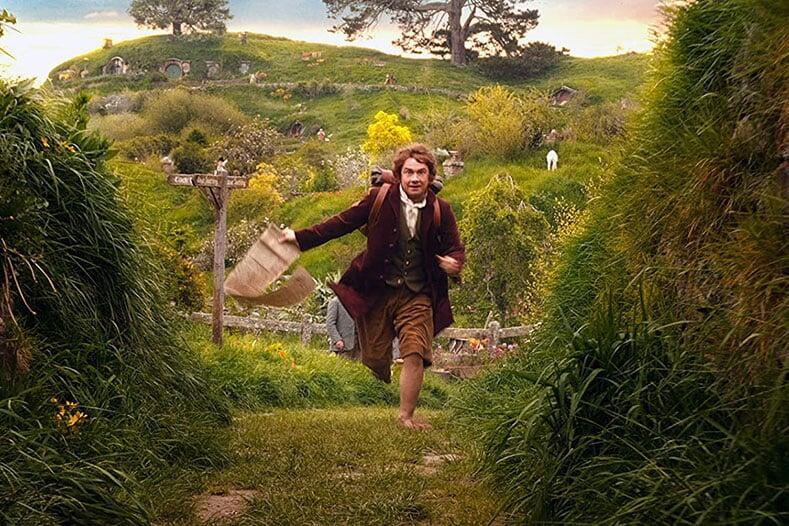You don't always have to go there and back again to learn a thing or two!

A good fantasy novel can both stir your imagination and provide a great escape from the troubles of the real world — and this is especially so of author J.R.R. Tolkien’s most famous (and best-selling) novels, The Hobbit and the Lord of the Rings trilogy, all of which have gone on to be adapted into major feature films, even going on to win several Academy Awards, including the coveted prize for Best Picture.
Since the publication of The Hobbit in 1937, readers have flocked to Middle Earth, the fantasy realm that Tolkien created, where he first introduced the world to Bilbo Baggins, a brave hobbit who resides in the Shire, along with the wise wizard Gandalf the Grey, and the group of Dwarves that Bilbo agrees to accompany on a quest to reclaim their home from the wealthy dragon that resides there.
He followed up the novel with The Fellowship of the Ring, the first book in the Lord of the Rings trilogy in 1954, only this time his story centred around Bilbo’s nephew Frodo, as he undertook a brave journey to destroy an evil ring, with the help of his hobbit friends, elves, dwarves, and even men, as several battles against evil forces take place around them, threatening the quest at every turn. That story would continue in The Two Towers, before eventually concluding in The Return of the King.
But what is it about Tolkien’s books that has proved so timeless? Why do fans keep returning to his stories, and devouring all his supplemental texts and materials that have been published since?
Well, part of it has to do with how relatable the characters are. We may not be hobbits, elves, dwarves or even wizards ourselves, but there’s plenty of takeaways from the journeys and struggles of Bilbo, Gandalf, and even Smaug the Dragon that we can apply in our own lives. Here are three of them now, along with the lines that inspired them:
1. “If more of us valued food and cheer and song above hoarded gold, it would be a merrier world.” — The Hobbit
One of the big themes in The Hobbit is that greed for gold and power corrupts, and eventually causes more pain and destruction. Be it Smaug the dragon, sitting on all his gold, after having taken over the dwarves’ former home, or the desperate Gollum in search of his “Precious,” (also known as the “One Ring,” the same one referred to in The Fellowship of the Ring). So Thorin’s lesson proves to be an important one. That perhaps the key to achieving a better world isn’t increasing our personal wealth, but rather, focusing on simpler things, like good food, friends, and family — as well as occasionally bursting into song when it calls for it!
2. “Even the smallest person can change the course of the future.” — The Fellowship of the Ring
While hobbits themselves are central to both of Tolkien’s biggest tales — first with Bilbo, and then Frodo and his friends Sam, Pippin, and Merry — it’s often remarked upon that hobbits themselves are the most unlikely creatures to become heroes. Not only are they the smallest of the races to reside in Middle Earth, but they’re introverts who prefer to stay home and lead a life of comfort (usually), tending to their gardens between one of their many, many meals. But as both The Hobbit and The Lord of the Rings reveal, the fate of Middle Earth often comes to rest on the small, yet sturdy shoulders of a hobbit, and in each case, they find the strength and bravery to save the day. It’s a valuable lesson for readers to take away, about how everyone’s voice matters no matter how young or old they might be! We all have a say in the future of our world. It’s just up to us how we choose to express it.
3. “All we have to decide is what to do with the time that is given to us.”— The Fellowship of the Ring
In most stories, the heroes are always pressed for time, as danger looms at any moment — this is especially so in The Lord of the Rings, where the evil Sauron’s forces gather swiftly. And while it’s not quite the same thing, it also applies to our own lives. Unlike elves, dwarves, and even certain hobbits, our own lives are quite short. Therefore it’s up to us decide what we want to do in them, and what we might want to devote our lives to. Do we want to commit to making a more sustainable environment to the future? Do we want to change our own stories for the better? Do we finally want to pen the novel we’ve always felt we could write? It may not always be easy to find the right answer, but at least we can make a decision in the mean time.
Have any of Tolkien's books inspired you to change your life? Enter the Emirates LitFest Montegrappa Letter Writing Competition and tell us win a prize! And while we're on the topic of lessons we can learn, don't forget to check out our interview with The Book Thief's Marcus Zusak below!
